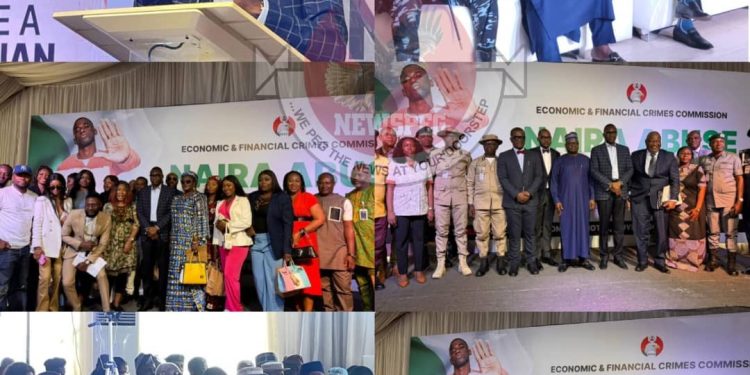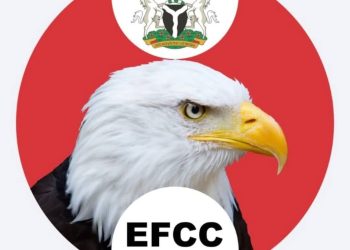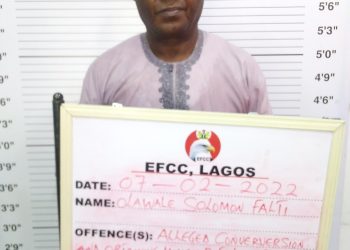By Nkechi Eze
The Executive Chairman of the Economic and Financial Crimes Commission (EFCC), Mr. Ola Olukoyede, has called on stakeholders in the entertainment, financial, and regulatory sectors to rally behind the Commission’s ongoing campaign to curb the abuse of the Nigerian currency, the Naira.
Speaking during a sensitization programme organized by the Lagos Zonal Directorate 1 of the EFCC on Friday, July 18, 2025, Olukoyede decried the rising incidents of Naira mutilation and abuse across the country, describing it as a grave national concern and an affront to Nigeria’s sovereignty.
The event drew participants from diverse sectors, including movie producers, musicians, non-governmental organizations, media practitioners, bureau de change operators, and legal experts. It also featured prominent entertainers such as King Alabi Pasuma, MI Abaga, ill Bliss Goretti, Osas Ighodaro, Pretty Mike, Terry Apala, Mercy Aigbe, Kazim Adeoti, Funke Bucknor-Obruthe, and Anto Lecky.
According to an official statement signed by the EFCC’s spokesperson, Dele Oyewale, Olukoyede emphasized that the Naira is not merely a means of exchange but a profound symbol of national identity and pride.
“The Naira is a symbol of our sovereignty. How we treat it reflects how much we respect ourselves as a people,” he said.
He lamented the increasing normalization of Naira abuse at social events, particularly through practices such as spraying, stamping, and deliberate mutilation. “Over the past year, the EFCC, in collaboration with the Central Bank of Nigeria (CBN), has intensified enforcement and public awareness campaigns to combat Naira abuse,” he stated.
These efforts, Olukoyede noted, include the establishment of a dedicated Task Force on Dollarization and Naira Abuse, as well as the prosecution of offenders, including public figures and celebrities. He warned that the popular justification that spraying money is “a cultural practice” is untenable under the law.
“As a salary earner myself, it is unimaginable for me to throw my hard-earned income into the air. An offence is an offence, and ignorance of the law is no excuse,” Olukoyede said.
He added that Naira abuse imposes a significant financial burden on the CBN, which spends vast amounts of public funds annually replacing defaced or mutilated notes. “It is not just illegal; it is economically harmful.”
Olukoyede urged entertainers and influencers to leverage their platforms and performances to champion the respect and proper handling of the national currency. “In every performance, let one of your opening lines be a reminder to your fans that spraying or stamping on the Naira is a crime. We must all rise to defend the integrity of our currency,” he charged.
Highlighting the EFCC’s broader commitment to economic integrity, Olukoyede revealed that N100 billion in recovered proceeds of crime had already been channelled into key national initiatives, including the National Education Loan Fund (NELFund) and the Consumer Credit Scheme (Credicorp). Recovered assets, he noted, have also funded projects such as the Federal University of Applied Sciences in Kachia and an NDDC liaison office in Bayelsa.
Also speaking at the event, Director General of the National Orientation Agency (NOA), Lanre Issa-Onilu, praised the creative industry for its invaluable contributions to national identity and growth. He, however, urged stakeholders to align their influence with civic responsibility and national cohesion.
“The abuse of the Naira is not only unlawful, it is unethical,” Issa-Onilu declared. “The Naira is not confetti. It is not an accessory for prestige. It is a national asset that demands respect. When you honour the Naira, you honour Nigeria.”
He further outlined the NOA’s interventions under the Nigerian Identity Project (NIP) and the National Values Charter, which aim to instil civic responsibility, patriotism, and respect for national symbols.
According to him, the agency is currently deploying a multilingual civic education campaign across schools, marketplaces, and traditional institutions, bolstered by an AI-powered assistant, CLHEEAN, accessible via the NOA’s website to provide real-time guidance on civic conduct, crime prevention, and national values.
Issa-Onilu emphasized the need for grassroots mobilisation, calling on traditional leaders, faith-based institutions, market unions, and youth groups to join the national effort. “This campaign must be national in scope but local in execution. Everyone has a role to play in restoring the dignity of the Naira. Let us be the generation that made respect for our currency fashionable again,” he concluded.















